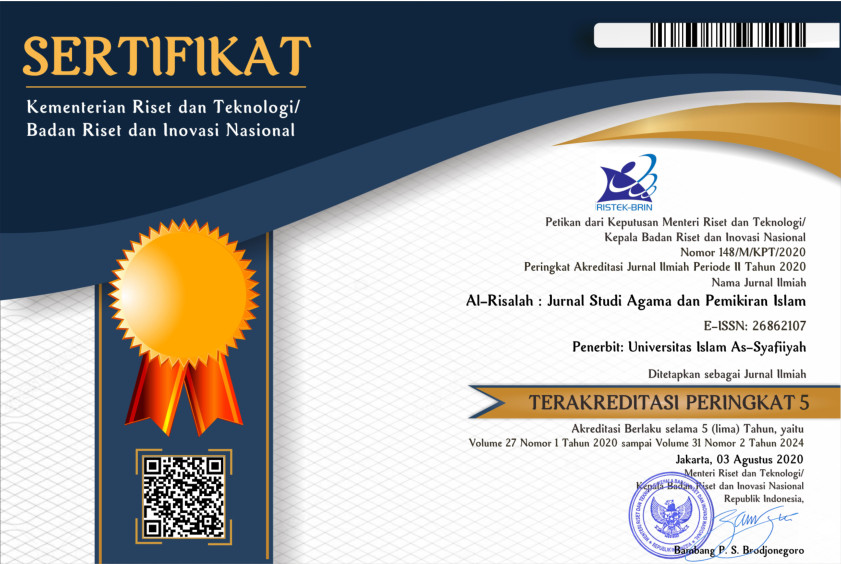Menyelaraskan Akhlak Integrasi Akhlak Dalam Dimensi Spiritual, Teologis, Syariat, Pendidikan dan Filsafat
Menyatukan Nilai-Nilai Akhlak dalam Kerangka Spiritual, Teologis, Syariat, Pendidikan, dan Filosofis
Abstract
Abstract. Morals are a vital foundation in human life, which includes behavioral aspect not only physically, but also spiritually, theologically, syariat, educationally, and philosophically. This article aims to explore the integration of morals in these various dimensions. In the spiritual dimension, morals are closely related to the concept of sufism which emphasizes cleansing the soul and closeness to Allah swt. Meanwhile, in the teological dimension, morals are related to the concept of monotheism, which emphasizes belief in the unity of Allah swt. From a syariat perspective, morals are reflected in obedience to islamic laws that regulate human behavior. In the educational context, morals are the main focus in the tarbiyah process, which aims to shape individual character. Philosophically, morals are debated in the realm of ethics, which discusses the concept of goodness, truth and human moral obligations. This combination of morals with various dimensions confirms that morals are a multidimensional concept that embraces spiritual, theological, syariat, educational, and philosophical aspects. it is hoped that this study will provide a holistic understanding of the foundations of morals and their role in forming a kind human personality and integrity.
Abstrak. Akhlak merupakan landasan vital dalam kehidupan manusia, yang mencakup aspek perilaku tidak hanya secara fisik, tetapi juga secara spiritual, teologis, syariat, pendidikan, dan filosofis. Artikel ini bertujuan untuk mengeksplorasi integrasi akhlak dalam berbagai dimensi tersebut. Dalam dimensi spiritual, akhlak terkait erat dengan konsep tasawuf yang menekankan pembersihan jiwa dan kedekatan dengan Allah swt. Sementara dalam dimensi teologis, akhlak berkaitan dengan tauhid, yang menekankan keyakinan akan keesaan Allah swt. Dari perspektif syariat, akhlak tercermin dalam ketaatan terhadap hukum-hukum islam yang mengatur perilaku manusia. Dalam konteks pendidikan, akhlak menjadi fokus utama dalam proses tarbiyah, yang bertujuan untuk membentuk karakter individu. Secara filosofis akhlak diperdebatkan dalam ranah etika, yang membicarakan konsep kebaikan, kebenaran, dan kewajiban moral manusia. Penggabungan akhlak dengan berbagai dimensi ini menegaskan bahwa akhlak merupakan konsep multidimensional yang merangkul aspek spiritual, teologis, syariat, pendidikan, dan filosofis. Kajian ini diharapkan akan memberikan pemahaman holistic tentang landasan akhlak dan perannya dalam membentuk kepribadian manusia yang baik dan berintegritas.
References
Aisyah, N. (2021, JANUARI Minggu). KONSEP PENDIDIKAN AKHLAK PEMIKIRAN IBNU MISKAWAIH DALAM KITAB TAHDZIB AL-AKHLAK. Diambil kembali dari REPOSITORY INSTITUT AGAMA ISLAM PEMALANG: https://repository.stitpemalang.ac.id/id/eprint/7/
Amir, D. (2012). KONSEP MANUSIA DALAM SISTEM PENDIDIKAN ISLAM. AL-TA'LIM, 192.
Anwar, S. (2021). INTERNALISASI NILAI PENDIDIKAN AKHLAK DALAM SURAT AL-HUJURAT TAFSIR FI ZILALIL QUR'AN. ISLAMIC EDUCATION, 2-3.
Arroisi, J. (2013). INTEGRASI TAUHID DAN AKHLAK DALAM PANDANGAN FAKHRUDDIN AL-RAZI. TSAQAFAH, 332-333.
Awaliyah, T., & Nurzaman. (2018). KONSEP PENDIDIKAN AKHLAK MENURUT SA'ID HAWWA. PENELITIAN PENDIDIKAN ISLAM, 26.
Choli, I. (2019). PEMBENTUKAN KARAKTER MELALUI PENDIDIKAN ISLAM. TAHDZIB AL-AKHLAQ JURNAL PENDIDIKAN ISLAM, 9.
Fahira, W. R., Sari, G. Y., & Setawati, M. (2023). PERANAN FILSAFAT DALAM PEMBENTUKAN MORALITAS SISWA. EDUSOCIATA JURNAL PENDIDIKAN SOSIOLOGI, 33-35.
Falah, A. S. (2023). NILAI-NILAI PENDIDIKAN AKHLAK DALAM AL-QURAN SURAH LUQMAN AYAT 12-15. MADRASAH JURNAL ON EDUCATION AND TEACHER PROFESIONALISM, 259.
Habibah, S. (2015). AKHLAK DAN ETIKA DALAM ISLAM. PESONA DASAR, 74-86.
Ibad, W. (2021). ANALISIS NILAI-NILAI PENDIDIKAN AGAMA ISLAM DALAM PROFIL PELAJAR PANCASILA. WASILATUL IBAD, 129.
Inayah, N. N. (2021). INTEGRASI DIMENSI PROFIL PELAJAR PANCASILA DALAM MATA PELAJARAN PENDIDIKAN AGAMA ISLAM MENGHADAPI ERA 4.0 DI SMK NEGERI TAMBAKBOYO. JURNAL OF EDUCATION AND LEARNING SCIENCES, 4-5.
Kurniawati, I., Silvya, W., & Sari, H. P. (2023). PEMIKIRAN AL-GHAZALI TENTANG FILSAFAT PENDIDIKAN ISLAM DAN PEMBENTUKAN KARAKTER: RELEVANSINYA UNTUK MASYARAKAT. TAWSHIYAH: JURNAL SOSIAL KEAGAMAAN DAN PENDIDIKAN ISLAM, 12.
Putri, F. D., Rahmadhani, T., Kartika, W., & Gusmaneli. (2024). RELEVANSI PENDIDIKAN ISLAM DALAM MEWUJUDKAN MASYARAKAT MADANI. PENDIDIKAN DAN KEGURUAN, 16-18.
Qomari, R. (2009). PRINSIP DAN RUANG LINGKUP PENDIDIKAN AQIDAH AKHLAQ. INSANIA, 2-3.
Rambe, M. S., Waharjani, & Perawironegoro, D. (2023). PENTINGNYA PENDIDIKAN AKHLAK DALAM KEHIDUPAN MASYARAKAT ISLAM. TADARUS TARBAWY, 37-38.
Copyright (c) 2024 Tahdzib Al-Akhlaq: Jurnal Pendidikan Islam

This work is licensed under a Creative Commons Attribution 4.0 International License.
This work is licensed under a Lisensi Creative Commons Atribusi 4.0 Internasional.
Authors who publish with this journal agree to the following terms:
- Authors retain copyright and grant the journal right of first publication with the work simultaneously licensed under a Creative Commons Attribution License that allows others to share the work with an acknowledgment of the work's authorship and initial publication in this journal.
- Authors are able to enter into separate, additional contractual arrangements for the non-exclusive distribution of the journal's published version of the work (e.g., post it to an institutional repository or publish it in a book), with an acknowledgment of its initial publication in this journal.
- Authors are permitted and encouraged to post their work online (e.g., in institutional repositories or on their website) prior to and during the submission process, as it can lead to productive exchanges, as well as earlier and greater citation of published work (See The Effect of Open Access).




